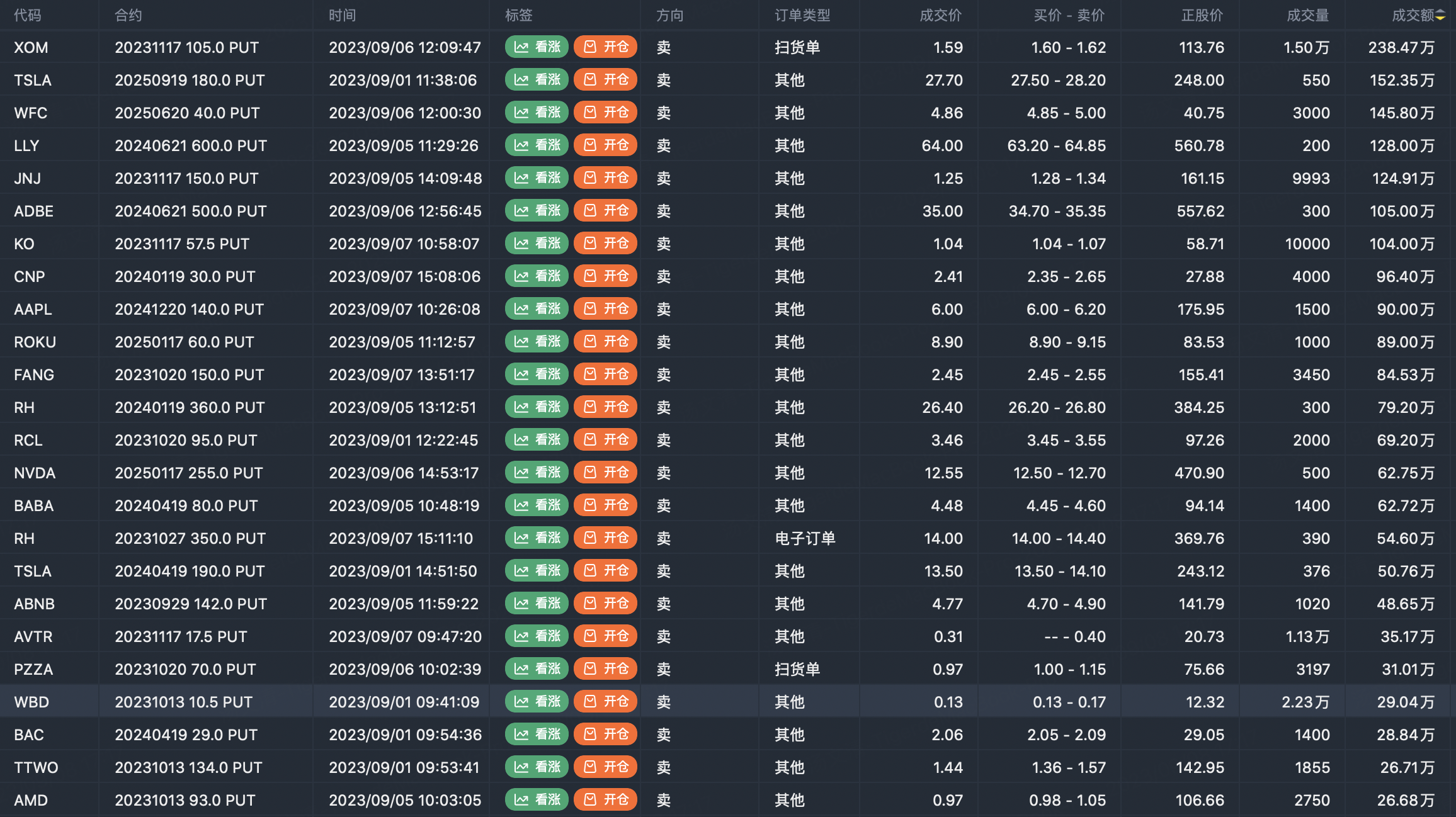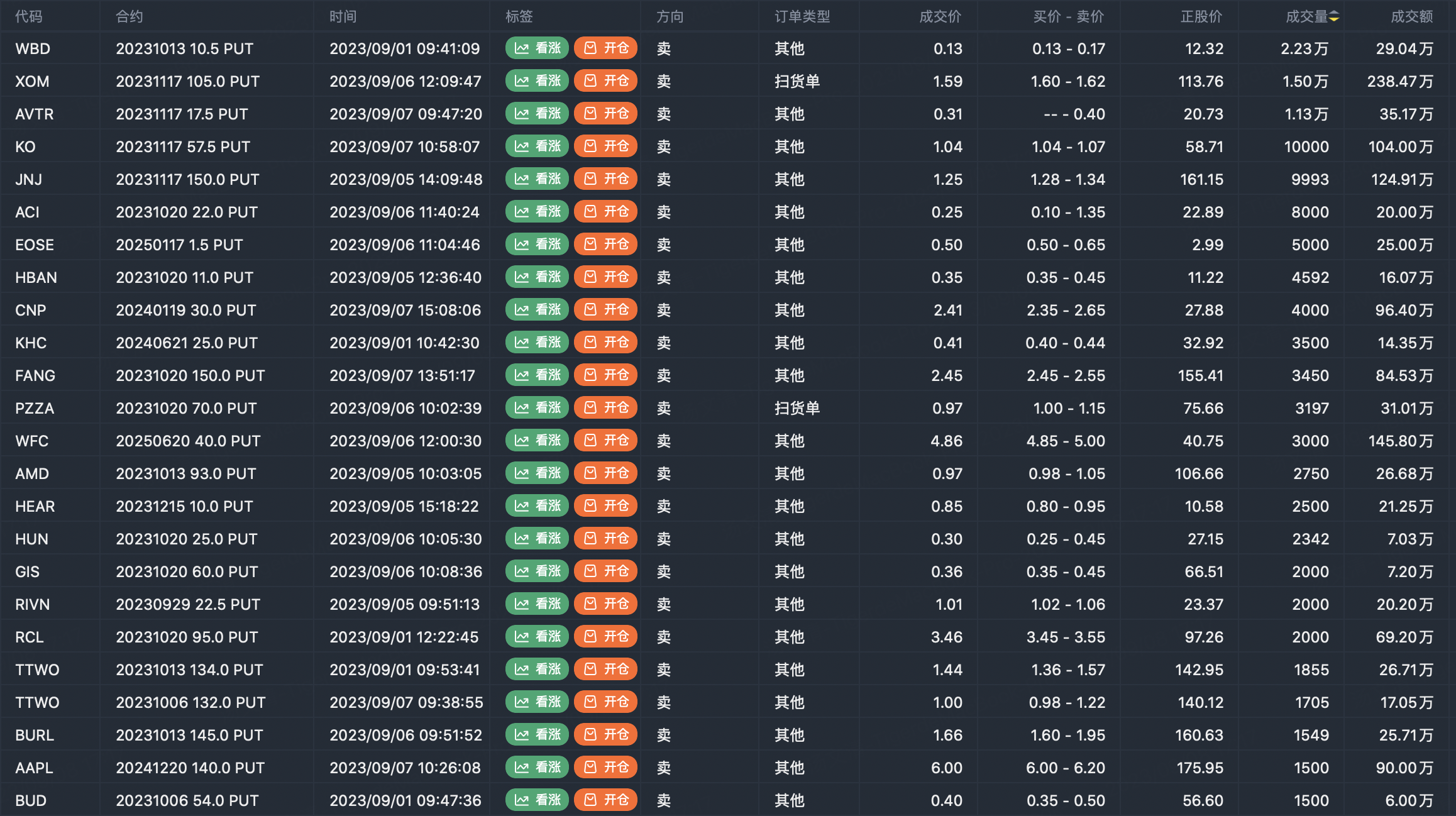An overview of this week's selling put strategies:
Sort by turnover
Sort by volume
This week's put strategy picks
Exercise price: 57.5; Expiration date: Nov 17; Volume: 10,000 lots; Total turnover: $1.04 million; Stock price at transaction: $58.7;
Annualized return: 10%
Company introduction:
The Coca-Cola Company is the world's largest non-alcoholic beverage company. The company owns or licenses and sells more than 500 non-alcoholic beverage brands, as well as owns and sells four of the world's top five non-alcoholic fizzy soft drink brands: Coca-Cola, Diet Coke, Fanta and Sprite.
Recent news:
Coca-Cola shares fell below the key $60 threshold to close at $58.33, bringing the beverage giant's decline this year to 7 per cent. The previous low this year was on March 1, when the stock fell to $58.37. Coca-Cola is one of the best stocks to buy in the Dow because the company continues to raise its dividend payout by about 5.5% per year. The second-quarter results were impressive, with the company beating analysts' expectations on both the top and bottom lines and raising its outlook for the rest of the year. Coke's shares trade at a reasonable 24 times forward earnings.
2 $Advanced Micro Devices(AMD)$
Exercise price: 93; Expiration date: Oct 13; Volume: 2750 lots; Total turnover: $260,000; Stock price at transaction: $106.6;
Annualized return: 10%
Company introduction:
AMD is a global semiconductor manufacturer with factories all over the world. In the global semiconductor industry, the company primarily provides: x86 microprocessors for the commercial and consumer markets; Embedded microprocessors for commercial and consumer markets; Desktop and laptop chipsets; Professional workstations and servers; Video graphics and multimedia products for desktop and laptop computers, including domestic media computers, professional gaming workstations and servers and related technologies.
Recent news:
The AI sector has encountered headwinds recently, with investors refocusing on fundamentals after Wall Street raised its outlook for the broader stock market. "We do not believe that the current revenue metric (revenue) will see a material uptick to justify greater investment (in generative AI)," JP Morgan analyst Pinjalim Bora wrote in a note on Thursday after the market sentiment shifted following C3Ai's earnings report. In anticipation of a possible further pullback in the semiconductor sector, the agency put its sell put target price at 93.
Exercise price: 105; Expiration date: Nov 17; Volume: 15,000 lots; Total turnover: $2.38 million; Stock price at transaction: $113.76;
Annualized return: 7%
Company introduction:
Exxonmobil was founded in New Jersey in 1882. The company's segments and affiliates operate or sell products in the United States and most other countries of the world. Their principal activities are related to the exploration and production of crude oil and natural gas, as well as the manufacture, trade, transportation and sale of crude oil, natural gas, petroleum products, petrochemicals and various specialty products.
Recent news:
Crude oil futures prices on Thursday (7) closed lower, WTI crude oil futures rose 9 days in a row to the highest point this year, prices fell. Official data showing U.S. crude supplies fell by more than 6 million barrels last week helped keep a lid on price losses.
Exercise price: 150; Expiration date: Nov 17; Volume: 9993 lots; Total turnover: $1.24 million; Stock price at transaction: $161;
Annualized return: 4.2%
Company introduction:
Johnson & Johnson, together with its subsidiaries, employs approximately 152,700 people worldwide and is engaged in the research and development, production and marketing of a broad range of products in the healthcare sector. The Johnson & Johnson Executive Committee is the primary management team, and the committee is responsible for overseeing and coordinating the activities of the company's three business units: Consumer, Pharmaceutical and Medical Devices.
Recent news:
J&j reported better-than-expected second-quarter earnings and raised its full-year forecast. Sales in the company's medical technology business unit surged in the April-June period. The company said there was also a rebound in non-emergency procedures among older adults who delayed surgery during the pandemic. Johnson & Johnson now expects full-year revenue of $98.8 billion to $99.8 billion, about $1 billion above its previous forecast, making it one of the best Dow stocks to buy in the long run.
sell $ABNB 20230929 142.0 PUT$
Exercise price: 142; Expiration date: Sep 29; Volume: 1020 lots; Total turnover: $480,000; Stock price at transaction: $141.79;
Annualized return: 44.9%
Company introduction:
Airbnb, Inc. operates a global marketplace where hosts can provide accommodations and experiences for their guests. As of September 30, 2020, its more than 4 million hosts had 7.4 million homes and experience listings, 5.6 million of which were active listings. The company's listings include private rooms, entire homes, luxury villas, treehouses, igloos and experiences in approximately 100,000 cities in more than 220 countries and territories.
Recent news:
S&p Dow Jones Indices announced that Blackstone and Airbnb will join the S&P 500, replacing LNC and NWL, with the changes effective before trading begins on September 18.
6 $Albertsons Companies, Inc.(ACI)$
Exercise price: 22; Expiration date: Oct 20; Volume: 8000 lots; Total turnover: $200,000; Stock price at transaction: $22.89;
Annualized return: 9.2%
Company introduction:
Albertson's is one of the largest food retailers in the United States, with 2,260 stores in 34 states and the District of Columbia. The company operates 20 iconic banners with an average of 85 years of operating history, Albertsons, Safeway, Vons, Pavilions, Randalls, Tom Thumb, Carrs, Jewel-Osco, Acme, Shaw's, Star Market, United Supermarkets, Market Street and Haggen. The company ranks first or second in market share in 66% of the 121 metropolitan statistical areas in which it operates.
Recent news:
Kroger and Albertsons are in talks to sell some grocery stores to C&S Wholesale Grocers in order to win regulatory approval for their $25 billion merger, Bloomberg News reported on Tuesday, citing people familiar with the matter. The proposed deal would make the combined Kroger Albertsons the second-largest grocer in the United States behind retail bellwether Wal-Mart (WMT). Jpmorgan said a pick-up in mergers in the U.S. food retail sector appears "encouraging," which, coupled with recent antitrust setbacks by the U.S. government, has made investors more optimistic about a Crog-Albertson deal.
7 $Rivian Automotive, Inc.(RIVN)$
Exercise price: 22.5; Expiration date: Sep 29; Volume: 2000 lots; Total turnover: $200,000; Stock price at transaction: $23.37;
Annualized return: 62.34%
Company introduction:
Rivian Automotive, Inc. designs, develops and manufactures category-defining electric vehicles and accessories. The company sells them directly to customers in the consumer and commercial markets. The company's vehicles are equipped with a full suite of proprietary value-added services that address the entire vehicle lifecycle and deepen customer relationships.
Recent news:
Claire McDonough, finance director of electric car maker Rivia, said at the conference that the company will benefit from a significant drop in battery material prices at the end of this year and in 2024. In recent years, due to the growing demand for electric vehicles, coupled with the Russia-Ukraine war and the outbreak of COVID-19, the price of battery raw materials has soared to a record high. Market research firm TrendForce said on Thursday that weakening demand for electric vehicles this year has led to a drop in battery prices, and prices are expected to slide further this year.
Strategy introduction:
Selling a put option is a common option trading strategy.
A put option, as its name suggests, represents the right to short a stock. A trader buying a put option usually indicates a bearish trend in the stock, while selling a put option indicates that the trader wants to buy the stock at a certain strike price, or believes that the stock price will not fall below a certain strike price for a certain period of time, thereby earning a premium.
Sell the put option to receive the right to profit, and assume the obligation to exercise the right to buy the stock at a future agreed time.
Strategy advantages: sell to get the right fee, when the option expires, when the stock price is higher than or equal to the exercise price, there is no need to accept the positive stock.
Strategy disadvantages: When the option expires, when the stock price trend is not as expected and falls below the exercise price, it is still necessary to buy the positive shares at the exercise price, that is, to buy the shares above the positive share price.
Example:
When the stock price of Coca-Cola was 40 in that year, Buffett sold 5 million shares with an exercise price of 35 put, and obtained a royalty of $1.50 per share (that is, $750). If the expiration stock price was not lower than 35, the put would be cancelled and Buffett would earn 7.5 million. If the expiration stock price reached 35, Buffett would buy 5 million shares of Coca-Cola according to 35. And since the first 1.5 earned, the equivalent of the cost per share is only 33.5.


Comments
很棒的文章你想分享吗